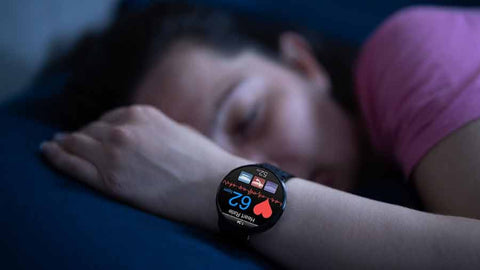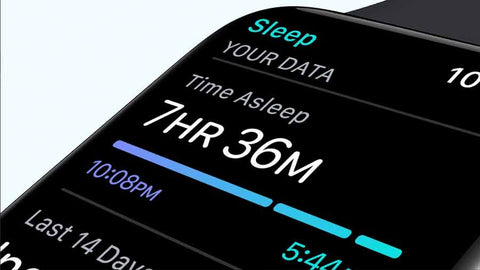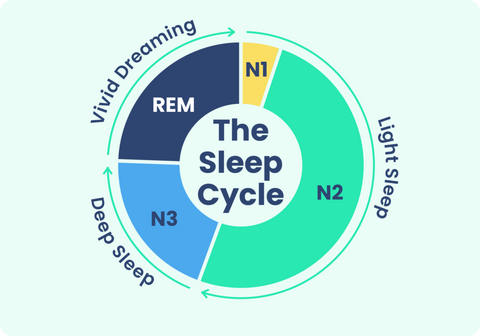
Sleep Monitoring in Smartwatches: Tracking Your Zzz's for Optimal Health
Share
Sleep Monitoring in Smartwatches: Tracking Your Zzz's for Optimal Health

Getting a good night's sleep is essential for our overall well-being. As we spend about a third of our lives asleep, it's important to understand the quality of our sleep to make necessary improvements. This is where sleep monitoring in smartwatches comes into play. With advanced sensors and intelligent algorithms, modern smartwatches can track your sleep patterns, helping you gain valuable insights into your sleep quality and duration.
Not getting enough sleep can have detrimental effects on our health, including:
- Reduced cognitive function and memory
- Impaired decision-making and problem-solving abilities
- Increased risk of accidents and injuries
- Weakened immune system
- Heightened risk of chronic conditions such as obesity, diabetes, and heart disease
- Mood disturbances such as irritability and depression
- Decreased overall quality of life
Therefore, incorporating sleep monitoring into our daily routines is crucial for optimizing our health and well-being.
Understanding Sleep Monitoring
Before delving into the details, let's briefly explain what sleep monitoring entails. Sleep monitoring is the process of tracking and analyzing your sleep patterns using a smartwatch or wearable device. These devices collect data on various aspects of your sleep, such as the duration of sleep, sleep stages, heart rate, and movement.
How Smartwatches Monitor Sleep Quality

Smartwatches use a combination of sensors and algorithms to monitor your sleep quality. These sensors can include an accelerometer, heart rate monitor, and gyroscope. Here's a breakdown of how the process generally works:
- Tracking Movement: The accelerometer detects movement and body positions, allowing the smartwatch to determine whether you're awake or asleep. It can differentiate between periods of restlessness and deep sleep.
- Measuring Heart Rate: By continuously monitoring your heart rate, the smartwatch can detect variations and identify different sleep stages. For example, during REM sleep, your heart rate tends to increase.
- Analyzing Data: The collected data is processed by sophisticated algorithms that analyze sleep patterns, durations, and transitions between sleep stages. These algorithms use machine learning techniques to provide accurate insights into your sleep quality.
Why It's Important to Monitor Our Sleep
Monitoring our sleep has several benefits for our overall health and well-being. Here are a few reasons why sleep monitoring is important:
- Understanding Sleep Quality: Sleep monitoring allows us to gain insights into the quality of our sleep. By analyzing data on sleep stages and movements, we can identify patterns and make adjustments to improve our sleep habits.
- Identifying Sleep Disorders: Sleep monitoring can help detect potential sleep disorders such as insomnia or sleep apnea. Early detection allows for timely intervention and treatment.
- Promoting Optimal Performance: Quality sleep is crucial for cognitive function, memory consolidation, and overall performance. Monitoring our sleep helps ensure we are getting enough restorative sleep to perform at our best.
- Establishing Healthy Sleep Habits: By tracking our sleep patterns, we can establish a consistent sleep routine and create healthy habits that contribute to better sleep quality and overall well-being.
Sleep Cycles and Recommended Hours
Sleep is not a uniform state; it consists of different stages. The two main types of sleep are:
| Sleep Stage | Description |
|---|---|
| REM (Rapid Eye Movement) Sleep | This is the stage associated with dreaming, increased brain activity, and rapid eye movements. It plays a crucial role in memory consolidation and learning. |
| Non-REM Sleep | Non-REM sleep consists of three stages: N1, N2, and N3. During these stages, your body gradually enters deeper sleep, and important physiological processes, such as tissue repair and growth, occur. |
Sleep cycles refer to the recurring patterns of sleep stages we go through during a night's rest. Each sleep cycle typically lasts around 90 minutes and consists of both REM and non-REM sleep stages. For optimal rest, it is recommended to aim for multiple complete sleep cycles per night.

The number of sleep cycles can vary from person to another, but on average, most adults require 4-6 sleep cycles per night, which translates to approximately 7-9 hours of sleep. However, individual sleep needs may differ, and it's important to find the duration that leaves you feeling refreshed and energized.
Keep in mind that sleep quality is just as important as quantity. By monitoring your sleep with a smartwatch, you can track not only the duration but also the quality of your sleep, ensuring you achieve restful nights and wake up ready to tackle the day.
By utilizing the sleep monitoring capabilities of our smartwatches, you can take control of your sleep and make informed decisions to improve your overall well-being. Explore our collection of smartwatches to find the perfect companion on your journey to better sleep.
